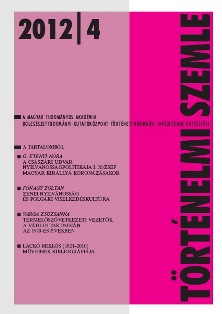Meghívás „vadászatra, magánemberként”. Franz Josef Strauß elsõ látogatása Magyarországon, 1977
Invitation as “private person” for “hunting”. The First Visit of Franz Josef Strauß to Hungary, 1977
Author(s): Tibor Dömötörfi, Andreas Schmidt-SchweizerSubject(s): History
Published by: Magyar Tudományos Akadémia Bölcsészettudományi Kutatóközpont Történettudományi Intézet
Summary/Abstract: The Bavarian politician, Franz Josef Strauß (1915–1988) was one of the most outstanding, yet at the same time most controversial political personalities of the German Federal Republic. Strauß, a man amply endowed with political sense and rhetorical abilities, held several ministerial posts in the federal government during the chancellorship of Konrad Adenauer, between 1956 and 1962 leading the ministry of defence. His political activities were not free of spectacular scandals, however. By the late 1940s he had already become one of the leaders of the Christian Social Union (CSU), and headed the party from 1961 right until his death in October 1988. His political stance was determined from the outset by an especially provocative and militant anti-communism. From 1969 he was one of the toughest opponents of the “eastern policy” which was initiated by the social democratic–liberal coalition under the leadership of Willy Brandt. From the 1960s Strauß set himself on a surprisingly active foreign political course. Pursuing a particular “shadow foreign policy” of his own, he visited several countries of the world, among them Hungary. Franz Josef Strauß made efforts already in 1966 and 1968 to get an invitation from Hungary for an incognito visit, but his requests were then turned down by the Hungarian communist party leadership. It was only after the relationship between the German Federal Republic and the “Eastern Block” in general had improved considerably that the time became ripe for a Hungarian visit by Strauß. Between 25 and 28 September 1977 he came for the first time to the Hungarian People’s Republic, in the form of a “private visit”. According to the decision taken by the Political Committee of the Central Bureau of the Hungarian Communist Party at its session on 6 September 1977, Strauß was hosted as a “private person” by János Nagy, deputy minister of foreign affairs. Alongside private programs (hunting), the Bavarian politician was received for a political conversation by Antal Apró, president of the Hungarian parliament. Although he was denied talks on a higher level, and could not meet party head János Kádár himself, Strauß reported very positively about Hungary and the political and economic stability there. As a convinced anti-communist, his intention was certainly to contribute to the internal division of the “Eastern Block” and thus to the weakening of the Soviet Union. His visit to Hungary and his positive remarks about it can at least be interpreted in that light as well. Yet it is the same certain that his journey to Hungary made a truly deep influence on Strauß, and, consequently, helped the dynamic development of the political, cultural, scientific and economic relations between the two countries. As for the Soviet leadership, they judged that both the management of the journey of Strauß to Hungary and its treatment in the press were totally acceptable.
Journal: Történelmi Szemle
- Issue Year: 2012
- Issue No: 04
- Page Range: 653-666
- Page Count: 14
- Language: Hungarian

